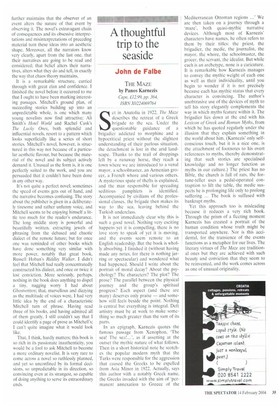A thoughtful trip to the seaside
John de Falbe
THE MAZE by Panos Karnezis Cape, £12.99, pp. 364, ISBN X0224069764 Set in Anatolia in 1922, The Maze describes the retreat of a Greek brigade to the sea. Under the questionable guidance of a brigadier addicted to morphine and a hypocritical priest without the slightest understanding of their parlous situation, the detachment is lost in the arid landscape. Thanks to the trail of droppings left by a runaway horse, they reach a town where we are introduced to a venal mayor, a schoolmaster, an Armenian grocer, a French whore and various others. A mysterious spate of thefts is explained, and the man responsible for spreading
seditious pamphlets is identified. Accompanied by civilians of the professional classes, the brigade then makes its way to the sea, leaving behind the Turkish underclass.
It is not immediately clear why this is such a good novel. Nothing very exciting happens yet it is compelling, there is no love story to speak of yet it is moving, and the events seem remote to an English readership. But the book is wholly absorbing. I finished it (without having made any notes, for there is nothing jarring or spectacular) and wondered what had happened. Should I write about the portrait of moral decay? About the psychology? The characters? The plot? The prose? The parallel between the physical journey and the group's spiritual progress? Each aspect (and there are many) deserves only praise — and somehow still feels beside the point. Nothing is central but everything is integral. Deft artistry must be at work to make something so much greater than the sum of its parts.
In an epigraph, Karnezis quotes the famous passage from Xenophon, 'The sea! The seat...', as if asserting at the outset the mythic nature of what follows. Then in a short historical note he scotches the popular modern myth that the Turks were responsible for the aggression that caused the Greeks to be expelled from Asia Minor in 1922. Actually, says this author with a notably Greek name, the Greeks invaded with the aim of 'permanent annexation to Greece of the Mediterranean Ottoman regions ...' We are then taken on a journey through a 'maze', both quasi-mythic narrative devices. Although most of Karnezis' characters have names, he often refers to them by their titles: the priest, the brigadier, the medic, the journalist, the mayor, the whore, the schoolmaster, the grocer, the servant, the idealist. Hut while each is an archetype, none is a caricature. It is remarkable how Karnezis manages to convey the mythic weight of each one as well as their individuality, until you begin to wonder if it is not precisely because each has mythic status that every character is convincing. The author's unobtrusive use of the devices of myth to tell his story elegantly complements the way in which myths feature within it. The brigadier lies down at the end with his Lexicon of Greek and Roman Myths, from which he has quoted regularly under the illusion that they explain something in the world about him. (Karnezis' only selfconscious touch, but it is a nice one, is the attachment of footnotes to his overt references to myths, thereby demonstrating that such stories are specialised knowledge and no longer function as myths in our culture.) The priest has no Bible, the church is full of rats, the fortune-teller uses a pedal-operated contraption to lift the table, the medic suspects he is prolonging life only to prolong suffering ... The book is suffused with bankrupt myths.
Yet this approach too is misleading because it reduces a very rich book. Through the prism of a fleeting moment Karnezis has created a portrait of the human condition whose truth might be transported anywhere. Nor is this accidental, for the transience of the events functions as a metaphor for our lives. The literary virtues of The Maze are traditional ones but they are achieved with such beauty and conviction that they seem to be reinvented, and the work comes across as one of unusual originality.


































































 Previous page
Previous page